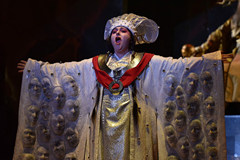| Opera Reviews | 28 April 2024 |
Turandot is worth losing sleep overby Steve Cohen |
|
| Puccini: Turandot Opera Philadelphia September 2016 |
|
|
It was the last composition by Giacomo Puccini, who was revered as the leading composer of verismo operas — that is, realistic dramas about ordinary people, such as La Bohème. Even his opera set in faraway Asia concerned a typical American sailor and an ordinary teenage girl, Madama Butterfly. Puccini made a turn-around with Turandot. This mythic tale about an empress and a prince lacks intimacy and relatable human qualities. But Puccini invested this opera with other aspects — exotic orchestral coloring and choral singing. He also added dissonances that surpassed his earlier creations. To obtain permission to marry the Chinese princess Turandot, a suitor must solve three riddles or he’ll be decapitated. Calaf passes the test, but offers the princess a way out of marrying him: if she is able to learn his name before dawn, then he will submit to his execution. The princess was described by Carlo Gozzi, the Italian playwright of Turandot, as a "tigerish woman" of "unrelenting pride." Much of Puccini’s music is grandiose, which is appropriate for the story but different from everything he had composed previously. The one exception is the character of Liù, Calaf’s adoring servant. When Turandot has Liù tortured, she chooses to commit suicide rather than reveal her master’s name. This situation resembled a real-life event. Puccini's wife Elvira accused their maid, Doria Manfredi, of having an affair with the composer, and Doria then committed suicide. The music for Liù is warm and human, and her music is tender. After Puccini composed her death scene he was unable to continue. Then he was diagnosed with throat cancer and died unexpectedly while undergoing radiation. As we know, Arturo Toscanini, conducting the premiere, stopped at the end of Liù’s funeral cortege and said “This is where the maestro laid down his pen.” The music was completed by Franco Alfano. The setting is an imaginary China, and some criticism has been leveled against Turandot as caricaturing Chinese people. But in an era when fake Orientalism was prevalent, Puccini’s writing was more authentic than Gilbert & Sullivan in The Mikado, Gustav Kerker in The Pearl of Pekin, and Sigmund Romberg in Cherry Blossoms. Puccini had used a bit of Japanese music in Madama Butterfly and made an even greater effort here. The music is inflected with pentatonic motifs, and Puccini used several Chinese melodies, including the folk tune "Mo Li Hua" (Jasmine Flower) which is sung by a children's chorus. As the princess and her suitor, this Philadelphia production presented artists who have already sung those roles at other major houses. Tenor Marco Berti, as Calaf, modulated his big voice nicely, with long, intelligent phrasing. Christine Goerke powerfully belted the princess’s music. These characters were drawn to each other solely because of looks, as they hardly knew each other, so it would be nice to see the parts played by gorgeous actors. We’ll have to wait for that. Of course, what’s more important is vocal strength, which they do have. Bass Morris Robinson was imposing as Timur, and Joyce El-Khoury, an Academy of Vocal Arts graduate, virtually stole the show as Liù, floating ethereal high A’s. Daniel Belcher, Julius Ahn and Joseph Gaines were amusing as the ministers Ping, Pang and Pong, who provide perspective with wisdom they’ve gleaned from long experience. Corrado Rovaris conducted with passion, though occasionally slowing the pace unduly to accommodate singers. Designer Andre Barbe and director Renaud Doucet used the symbolism of circles in this handsome production, basing the concept on the round moon and the large gong that announced each challenge. The stage of the Academy of Music did seem overcrowded in Act I and in Act III’s finale. It was nice to hear all the voices, but the on-stage traffic was congested.
|
|
| Text ©
Steve Cohen Photo © Kelly & Massa Photography |

 Within three consecutive days Opera Philadelphia presented three new productions. One was a world premiere (Breaking the Waves), another an American premiere (the African take on Macbeth). In all the fuss about them, some folks might not have given adequate appreciation to the innovative aspects (for its time) of Turandot.
Within three consecutive days Opera Philadelphia presented three new productions. One was a world premiere (Breaking the Waves), another an American premiere (the African take on Macbeth). In all the fuss about them, some folks might not have given adequate appreciation to the innovative aspects (for its time) of Turandot.





